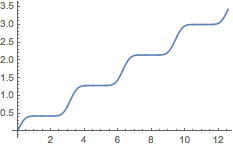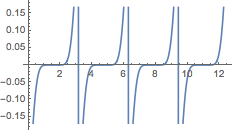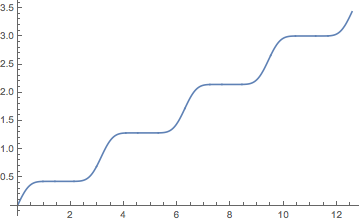I want to calculate the integral:
$$A_n=\int_0^{2\pi}\cos^{2n}(\theta-\theta_0)\mathrm d\theta$$
assuming that we are familiar with the relation:
$$\cos^{2n}x=\frac1{2^{2n}}\binom{2n}{n}+\frac1{2^{2n-1}}\sum_{k=0}^{n-1}\binom{2n}{k}\cos2(n-k)x$$ The answer should be:
$$A_n=\frac{\pi}{2^{2n-1}}\binom{2n}{n}$$
The code that I've used is the following:
$Assumptions = n ∈ Integers; substitute = {(Cos[x_])^(2 n) -> 1/2^(2 n) Binomial[2 n, n] + 1/2^(2 n - 1) * Sum[Binomial[2 n, k] Cos[2 (n - k) x], {k, 0, n - 1}]}; But I see that substitution is not done correctly:
Cos[θ - μ]^(2 n) /. substitute $2^{-2 n} \binom{2 n}{n}+2^{-2 n} e^{-2 i n (\theta -\mu )} \left(-\binom{2 n}{n} e^{2 i n (\theta -\mu )} \, _2F_1\left(1,-n;n+1;-e^{-2 i (\theta -\mu )}\right)-\binom{2 n}{n} e^{2 i n (\theta -\mu )} \, _2F_1\left(1,-n;n+1;-e^{2 i (\theta -\mu )}\right)+e^{4 i n (\theta -\mu )} \left(1+e^{-2 i (\theta -\mu )}\right)^{2 n}+\left(1+e^{2 i (\theta -\mu )}\right)^{2 n}\right)$
And the integral is calculated as:
A = Integrate[Cos[θ - μ]^(2 n) /. substitute, {θ, 0, 2 Pi}, Assumptions -> 0 <= μ <= 2 Pi] $\text{Integrate}\left[2^{-2 n} \binom{2 n}{n}+2^{-2 n} e^{-2 i n (\theta -\mu )} \left(-\binom{2 n}{n} e^{2 i n (\theta -\mu )} \, _2F_1\left(1,-n;n+1;-e^{-2 i (\theta -\mu )}\right)-\binom{2 n}{n} e^{2 i n (\theta -\mu )} \, _2F_1\left(1,-n;n+1;-e^{2 i (\theta -\mu )}\right)+e^{4 i n (\theta -\mu )} \left(1+e^{-2 i (\theta -\mu )}\right)^{2 n}+\left(1+e^{2 i (\theta -\mu )}\right)^{2 n}\right),\{\theta ,0,2 \pi \},\text{Assumptions}\to 0\leq \mu \leq 2 \pi \right]$
Is there any way to force mathematica calculate the explicit solution of the integral?
Edit: I wonder why I get the result:
Integrate[(Cos[t - t0])^(2 n), {t, 0, 2 Pi}, Assumptions -> n ∈ Integers && t0 ∈ Reals && 0 <= t0 < 2 Pi] // AbsoluteTiming (* {133.223, Integrate[Cos[t - t0]^(2 n), {t, 0, 2 \[Pi]}, Assumptions -> n ∈ Integers && t0 ∈ Reals && 0 <= t0 < 2 \[Pi]]} *) After considering all the information I gained from following links:
Singular integral mathematica
Correct way to integrate a certain function
Bug in mathematica analytic integration?
Suspected bug in Integrate
I also wrote the following code:
r := RandomReal[{0, 2 Pi}] Integrate[(Cos[t - t0])^(2 n) /. t0 -> r, {t, 0, 2 Pi}, Assumptions -> n ∈ Integers] // AbsoluteTiming (* {6.18195, 1/((0.5 + 1. n) Gamma[ 1. + n]) ((1.77245 + 1.77245 E^((0. + 6.28319 I) n)) Gamma[ 1.5 + n] + Gamma[1. + n] (-0.421391 E^(-0.342092 n) Hypergeometric2F1[0.5, 0.5 + 1. n, 1.5 + 1. n, 0.710283] + 0.421391 E^(-0.342092 n) Hypergeometric2F1[0.5, 0.5 + 1. n, 1.5 + 1. n, 0.710283]))} *) seems that I can never reach the solution
(* {19.1049, ConditionalExpression[((1 + (-1)^(2 n)) Sqrt[π] Gamma[1/2 + n])/Gamma[1 + n], Cos[x0] >= 0 && 2 π < x0 <= (5 π)/2]} *) expressed by @MichaelE2
Edit: I finally wrote the following code and I get the result except that I don't understand why is Global needed in my answer:
int = Simplify[(Cos[t - t0])^(2 n) Dt[t] /. t -> t0 + x // TrigExpand] /. {Dt[t0] -> 0, Dt[x] -> 1} (* Cos[x]^(2 n) *) Integrate[int, {x, -t0, 2 Pi - t0}, Assumptions -> n ∈ Integers && n > 0 && t0 ∈ Reals && 0 <= t0 < 2 Pi] (* ConditionalExpression[((1 + (-1)^(2 Global`n)) Sqrt[\[Pi]] Gamma[1/2 + Global`n])/Gamma[1 + Global`n], Global`t0 > 0 && 2 Global`t0 <= \[Pi]] *) 




Integrate). User variables normally are created in theGlobal`context, but I don't know why it shows up explicitly printed in the output. $\endgroup$